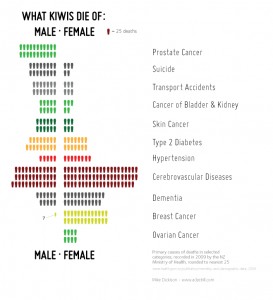Netflix owns your brains
Netflix has commissioned an American remake of the brilliant UK television series House of Cards. That’s not especially relevant to StatsChat, but apparently they did it with Big Data and Data Science, so it must be right.
Andrew Leonard at Salon bemoans how this is turning us into puppets
Netflix’s data indicated that the same subscribers who loved the original BBC production also gobbled down movies starring Kevin Spacey or directed by David Fincher. Therefore, concluded Netflix executives, a remake of the BBC drama with Spacey and Fincher attached was a no-brainer, to the point that the company committed $100 million for two 13-episode seasons.
“We know what people watch on Netflix and we’re able with a high degree of confidence to understand how big a likely audience is for a given show based on people’s viewing habits,” Netflix communications director Jonathan Friedland told Wired in November. “We want to continue to have something for everybody. But as time goes on, we get better at selecting what that something for everybody is that gets high engagement.”
The strategy has advantages that go beyond the assumption of built-in popularity. Netflix also believes it can save big on marketing costs because Netflix’s recommendation engine will do all the heavy lifting. Already, Netflix claims that 75 percent of its subscribers are influenced by what Netflix suggests to subscribers that they will like.
Felix Salmon (who is generally a believer in data) is not impressed
It should go without saying, of course, that dropping $100 million on a 26-episode remake of a great TV show is never a no-brainer. For one thing, for all that the original series is extremely good, it was also very timely, coming as it did at the end of Margaret Thatcher’s transformation of the Prime Minister’s office into something much more powerful and Presidential than the UK had ever seen. The BBC series tapped into Britain’s fear of the possible implications of that power, as well as the fact that Richard III and Macbeth are deeply rooted in the national psyche.
More generally, remakes are inherently dangerous things: what producers think of as a “proven formula” more often turns out to have been a unique and inimitable confluence of creative electricity. And it goes without saying that the better the original was, the less likely it is that the remake will surpass it.
Note that $100 million for 26 episodes is about 30% more than ‘Glee‘ costs, which in turn is about 50% more than the average prime-time drama. Will this be an investment no-brainer in the same sense as Florida real-estate? You might very well think so. I couldn’t possibly comment.

